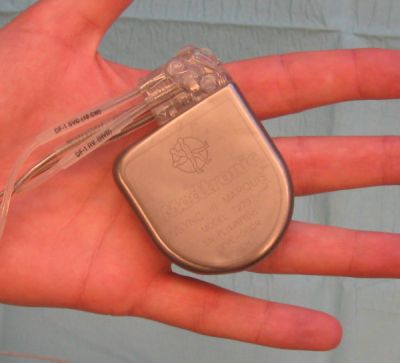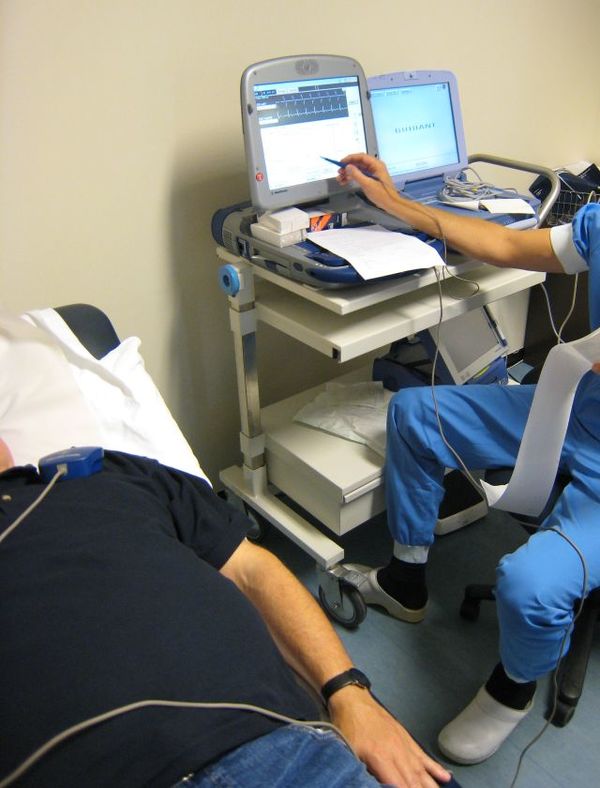ICD: verschil tussen versies
Naar navigatie springen
Naar zoeken springen
Geen bewerkingssamenvatting |
Geen bewerkingssamenvatting |
||
| Regel 4: | Regel 4: | ||
[[Image:ICD_wound.jpg|thumb|An ICD is usually implanted subcutaneously]] | [[Image:ICD_wound.jpg|thumb|An ICD is usually implanted subcutaneously]] | ||
[[Image:ICD_readout.jpg|thumb|The information stored in the ICD's memory can be read out using a coil that is put on the patients clothing near the ICD. Stored information includes battery life remaining and ICD shocks]] | [[Image:ICD_readout.jpg|thumb|The information stored in the ICD's memory can be read out using a coil that is put on the patients clothing near the ICD. Stored information includes battery life remaining and ICD shocks]] | ||
ICD (Implantable Cardioverter Defibrillator ): this device can detect and treat [[ | ICD (Implantable Cardioverter Defibrillator ): this device can detect and treat [[VT]] and [[VF]]. Usually the first treatment is anti-tachy pacing (pacing at a rate +- 10% above the ventricular rate in ventricular tachycardia, which can convert the rhythm to sinus rhythm). If this is not effective an defibrillator shock is delivered, usually with 16-36 Joules of energy. ICDs can save lives in patients who have a high risk of ventricular arrhythmias. All ICDs have optional pacemaker activity to treat bradycardias. New biventricular ICDs have 3 leads: an atrial lead, a left ventricular lead and a right ventricular lead.<cite>Passman</cite><cite>DiMarco</cite> | ||
==A short history of ICD therapy== | ==A short history of ICD therapy== | ||
Versie van 20 sep 2007 15:37
Deze pagina moet nog vertaald worden...



ICD (Implantable Cardioverter Defibrillator ): this device can detect and treat VT and VF. Usually the first treatment is anti-tachy pacing (pacing at a rate +- 10% above the ventricular rate in ventricular tachycardia, which can convert the rhythm to sinus rhythm). If this is not effective an defibrillator shock is delivered, usually with 16-36 Joules of energy. ICDs can save lives in patients who have a high risk of ventricular arrhythmias. All ICDs have optional pacemaker activity to treat bradycardias. New biventricular ICDs have 3 leads: an atrial lead, a left ventricular lead and a right ventricular lead.PassmanDiMarco
A short history of ICD therapy
- 1849 First graphical registration of VFHoffa
- 1899 First documented defibrillation of a dog with ventricular fibrillation (VF) in dogs.Prevost
- 1947 The thoracic surgeon Claude Beck saved the first human life by the successful use of cardiac defibrillation in a 14-year-old boy who developed VF during a thoracic surgical procedure and went on to achieve a full recovery.Beck
- 1973 Concept of implantable ICDMirowski1
- 1980 First human implantation of an ICDMirowski
References
<biblio>
- Hoffa Hoffa M,Ludwig C., Ztschrft Rat Med 1850; 9:107
- Prevost Prevost J, Batelli F. La mort par les courants electriques: courant alternative a bas voltage. J Physiol Path Gen. 1899; 1: 399–412.
- Beck Beck C, Pritchard W, Heil H. Ventricular fibrillation of long duration abolished by electric shock. JAMA. 1947; 135: 985–986.
- Mirowski pmid=6991948
- Mirowski1 pmid=4490731
- Passman Passman, Kadish. Circulation. 2007;116:561-571.
- DiMarco pmid=14602883
</biblio>